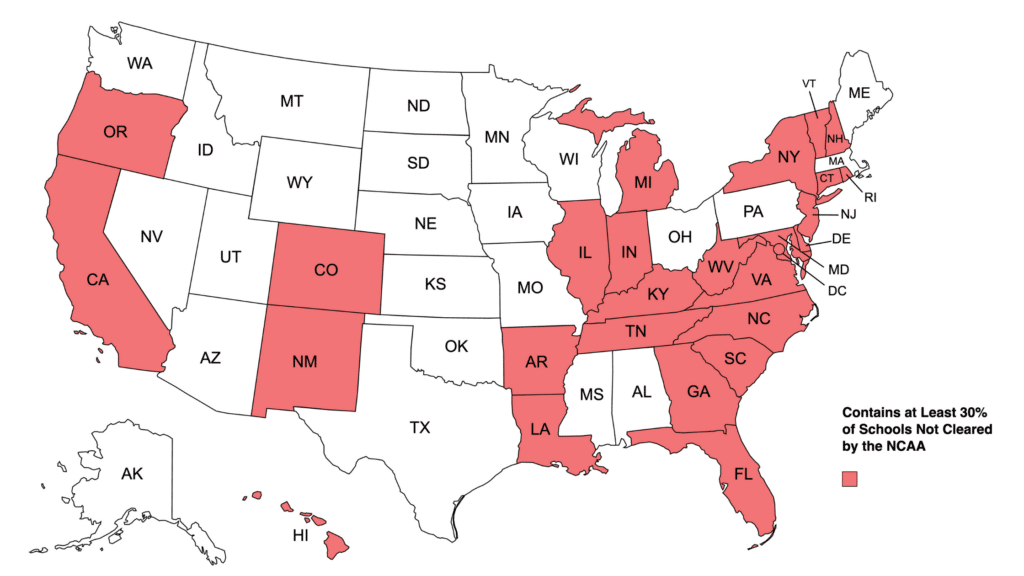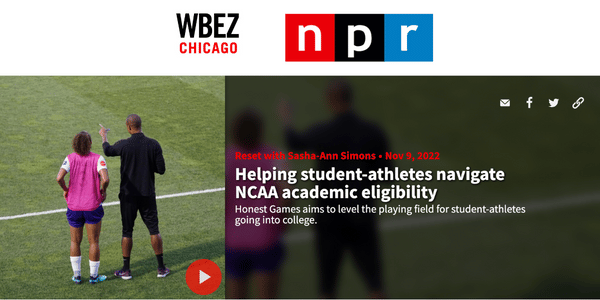NCAA High School Portal: The Hidden Barrier to College Access for Student-Athletes
Updated on Oct 1, 2024

Every year, nearly 1 million high school student-athletes hoping to access college athletic opportunities don’t meet NCAA academic eligibility for college sports due to preventable errors, study estimates.
A recent study led by Honest Game assessed the NCAA Eligibility Center Portal’s clearance status for high schools throughout the United States, with a focus on schools possessing an NCAA account but lacking “cleared” approval status.*
Students in 27% of high schools nationally are unable to access the $3.8 billion in college athletic scholarships available each year in DI and DII divisions, the study revealed. This equates to millions of dollars in lost scholarships for the students who need them the most. The numbers are likely higher than 27%, as this study excludes high schools lacking an NCAA account and those with NCAA-approved status but insufficient courses for full-qualifier designation.
This barrier to college access for so many youth is due to a failure to meet NCAA academic eligibility requirements, which is preventable if caught early and remediated.
The study uncovered that 1 in 3 high schools nationwide are deemed “Not Cleared” in the NCAA Eligibility Center’s High School Portal. A significant proportion of U.S. high schools either lack NCAA accreditation or have lapsed in meeting the clearance criteria set by the NCAA Eligibility Center. Each high school is responsible for NCAA Eligibility Center Portal course clearance and maintenance. The national shortage of high school guidance counselors and a current student caseload of more than double recommended by the American School Counselor Association compounds this problem.
To add complexity, each high school in the country has its own unique set of NCAA Core Courses, so there is no standard process. When students have transferred between multiple high schools, school counselors must untangle a web of classes to ascertain which classes meet NCAA Core Course requirements and which don’t.
What Does a “Not Cleared” NCAA Eligibility Center Designation Mean?
The results of this study have profound implications for students, school staff, and families. The “Not Cleared” designation signifies that the school is not deemed an accredited institution by the NCAA Eligibility Center. Until this status is changed to “Cleared”, students attending these high schools are unable to matriculate as college-bound student-athletes to any DI or DII NCAA-sanctioned college or university.
The high school’s management and housekeeping of the NCAA Eligibility Center Portal profoundly impact available post-secondary pathways and college athletic scholarship opportunities. As the cost of a college education continues to skyrocket, the importance of unlocking student access to all post-secondary pathways is a critical concern for students and families.
Navigating Without a Rudder: NCAA Clearance vs Guidance
The study emphasizes that while the NCAA’s role is to academically clear students, it is not their responsibility to guide them toward a cleared academic status. The absence of step-by-step guidance in tracking NCAA academic eligibility is akin to steering a boat without a rudder. And, often, by the time a student realizes that they are not on track to meeting NCAA academic eligibility requirements, it is too late to remediate because the student is so far off track.
Recognizing that a high GPA does not necessarily guarantee immunity from the risk of academic ineligibility in college sports is crucial. Firstly, academic eligibility requirements for college sports vary depending on the division and often go beyond just GPA, encompassing factors such as specific course completion and standardized test scores. Secondly, even students with strong GPAs may face challenges in meeting the NCAA or other collegiate athletic association’s eligibility criteria.
Determining the Scope of the Problem across the United States
The study reveals a state-by-state analysis of the percentage of high schools that are not cleared by the NCAA Eligibility Center. States where 30% or more of high schools lack a cleared NCAA Eligibility Center portal are highlighted in red, as they are at greater risk.
Note: The number of “not cleared” schools in the above graph is likely higher, as it does not account for high schools that have never submitted for NCAA approval and for high schools that are “cleared” but lack NCAA Core Courses, fall short of the 16-unit requirement, or have not audited their NCAA Eligibility Center Portal each year.
Honest Game supports high schools with NCAA Eligibility Center Portal clearance and housekeeping to ensure their students are properly granted NCAA Core Course credit, including the addition of the weighted grade scale, non-traditional course offerings, support document submissions/appeals (particularly ELL), and student tasks and consult on individual cases (e.g., early grad, re-class, ELL, IEP, etc.).
Honest Game is the only automated system to support school staff, students, and families in tracking a student-athlete’s academic eligibility for college sports. Contact Honest Game to learn more about our comprehensive support system.
* In 2019, Honest Game examined data sets from high schools across the US and analyzed it against the NCAA Eligibility Center School Portal to track the amount of schools that were not cleared by the NCAA.




